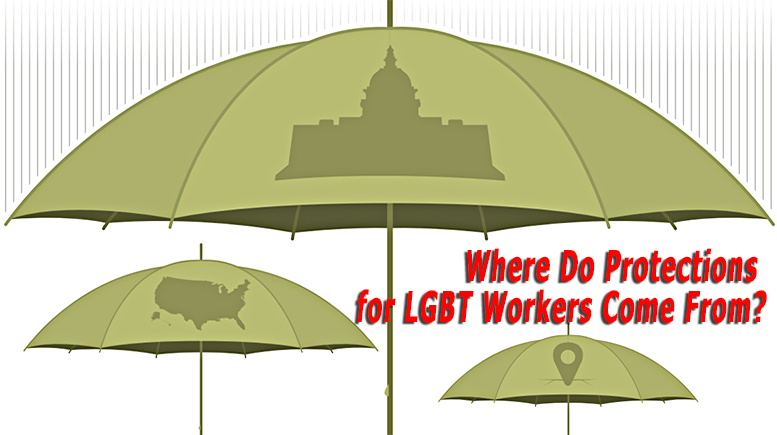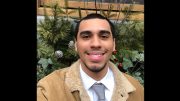Recent efforts by the Trump Administration emphasize need for clear nondiscrimination protections
NEW YORK—Last week, The New York Times reported that the Trump Administration is preparing to redefine the term “sex” for the purposes of several federal agencies. This redefinition is out of step with science, medicine, and the law—and it is intended to not only to eliminate protections for transgender and intersex people but to stop recognizing transgender and intersex people altogether. This latest proposal also creates more barriers to combating discrimination against lesbian, gay, bisexual and transgender (LGBT) individuals; while the Department of Justice previously would and did sue state/local government entities for anti-transgender discrimination that will not be the case with this administration.
A new brief from the Movement Advancement Project (MAP), the ACLU and Lambda Legal, Are LGBT Workers Protected from Discrimination? Unravelling the Patchwork of Federal, State, and Local Employment Protections, examines the existing federal, state and local laws and court rulings that offer protections to LGBT workers. This brief also examines the legal gaps that leave workers vulnerable to discrimination because laws don’t explicitly include the terms “sexual orientation” or “gender identity,” and courts have not interpreted sex discrimination provisions correctly.
“It is shocking to learn that nearly half of LGBT adults live in states that lack laws explicitly prohibiting discrimination at work for LGBT employees. And, most people wrongly assume that there is a federal law explicitly prohibiting anti-LGBT discrimination,” said Ineke Mushovic, MAP Executive Director. “The reality is that far too many LGBT employees remain at risk for discrimination, harassment, and even termination. It’s time to update our nondiscrimination laws, so that everyone can have a fair shot to earn a living and provide for their family.”
- Federal protections: A growing number of federal courts and the Equal Employment Opportunity Commission (EEOC) have concluded that when a person is discriminated against because of their sexual orientation or gender identity, such discrimination is inherently based on the individual’s sex and is therefore illegal under federal laws’ prohibitions on sex discrimination.
- State laws: Only 20 states and the District of Columbia have state statutes that explicitly prohibit discrimination in employment based on sexual orientation and gender identity, while two states have statutes that explicitly prohibit discrimination based on sexual orientation but not gender identity.
- Local progress: Because of a lack of progress at the federal and state levels, some cities and counties are acting to protect their residents. Since the first local nondiscrimination ordinance was passed in 1974, hundreds of cities and counties have passed local nondiscrimination ordinances to protect LGBT workers from discrimination. These local ordinances currently provide important job safeguards for thousands of LGBT individuals living in states lacking explicit state-level protections.
The reality is that far too many LGBT employees are at risk of discrimination, harassment and even unfair termination. Last week, the ACLU filed a response before the U.S. Supreme Court in a case in which Aimee Stephens, a transgender woman, was fired when she came out to her employer and informed them that she planned to start dressing in appropriate business attire for a woman.
“Aimee Stephens worked for six years, with nothing but positive feedback, when her employer fired her just because she came out as a woman. The Trump Administration told the Supreme Court that LGBTQ people should not be protected under federal civil rights law in briefs it filed in Aimee’s case,” said James Esseks, director, ACLU LGBT & HIV Project. “The American people want LGBTQ people to have protections under our nation’s civil rights laws, and a growing chorus of federal courts say that they already have those protections. What happened to Aimee was not only wrong, it was and should be against the law.”
Public support is on the side of passing comprehensive and inclusive nondiscrimination employment protections. In 2018, 71% of Americans said they support laws that protect LGBT people from discrimination, including majority support in every state across the country. However, despite this support, federal law, state laws, and the majority of local ordinances do not explicitly prohibit discrimination against LGBT workers because of their sexual orientation and gender identity.
“While we are making progress in getting the courts to interpret existing law to protect LGBT employees, employment cases operate on an uncertain timetable, and that effort could take many years,” said Greg Nevins, Counsel and Workplace Fairness Program Strategist. “That’s why updating our nondiscrimination laws, federally, in the states, and in cities and counties, is important. Everyone needs to be able to earn a living, including people who are LGBT. Employees should be judged on their qualifications, experience and the job they do—nothing more, and nothing less. The current patchwork only creates legal uncertainty for individual workers who face discrimination, and for their employers, who currently face different legal obligations in different jurisdictions.”
Click here to read the brief released today.
MAP‘s mission is to provide independent and rigorous research, insight and communications that help speed equality and opportunity for all. MAP works to ensure that all people have a fair chance to pursue health and happiness, earn a living, take care of the ones they love, be safe in their communities, and participate in civic life.
For nearly 100 years, the ACLU has worked in courts, legislatures, and communities to protect the constitutional rights of all people. With a nationwide network of offices and millions of members and supporters, we take up the toughest civil liberties fights. Beyond one person, party, or side — we the people dare to create a more perfect union. Learn more at aclu.org
Lambda Legal is a national organization committed to achieving full recognition of the civil rights of lesbians, gay men, bisexuals, transgender people and everyone living with HIV through impact litigation, education and public policy work.
[From a News Release]







